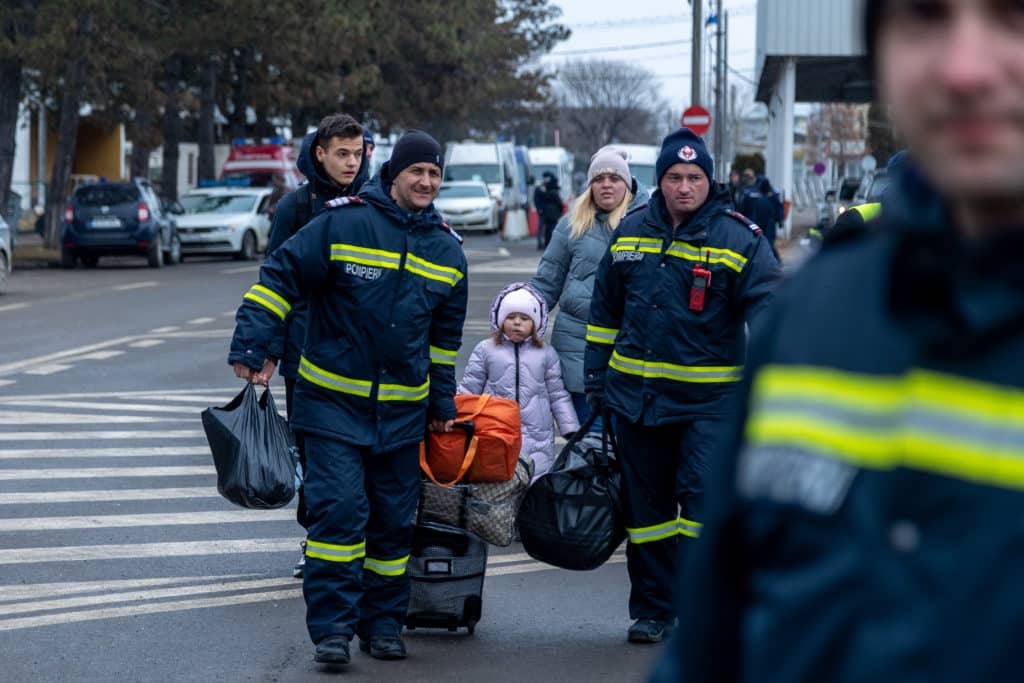Florida. Pakistan. The Horn of Africa. Ukraine. Afghanistan. If you’re keeping up with the news cycle, it seems like there’s a new emergency popping up at the forefront faster than we can even process the emergency that occurred before it. And with so many disasters happening around the world, it can feel flustering to decide when and where your gift can make the most impact.
Investing in disaster preparation, recovery and resilience goes hand-in-hand with advancing other global causes such as health, education, economic development and more. Our charity partners Americares, Direct Relief, International Medical Corps, Matthew 25: Ministries, Mercy Corps and Project HOPE have established track records of humanitarian assistance in developing countries, and the capabilities to respond swiftly whenever a disaster strikes.
This October, Global Impact recognizes Disaster Relief as our cause of the month. Below we’ll take a deep dive into some of the different kinds of disasters we see in the news and share how you can make the most impact for disaster relief efforts through your workplace giving campaign.
Natural Disasters
When we speak of disasters, the first thing that comes to mind is natural disasters. In 2020 alone, natural disasters caused $210 billion in damages. And as climate change continues, so does the frequency of natural disasters. Disasters related to changing temperatures, precipitation, sea levels and other factors increased 41% in a 10-year period. We also know that natural disasters hit developing countries the hardest, as they may lack the physical infrastructure or systems to cope with weather-related events. So, how do our charity partners prepare for and respond to natural disasters?
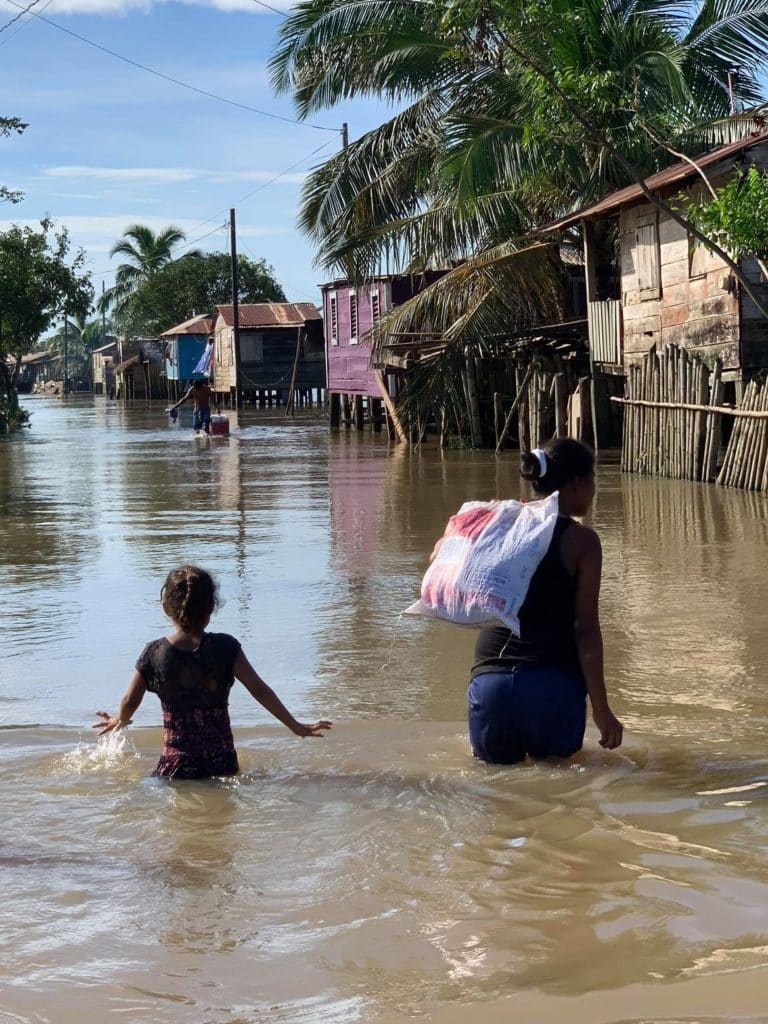
In November 2020, Hurricanes Eta and Iota made back-to-back landfall in Central America, hitting only two weeks apart. These storms swept through multiple countries, causing widespread flooding and devastating mudslides. Charity Alliance member Matthew 25: Ministries shipped over 375,000 pounds of personal care items, household and cleaning products, disaster blankets and more throughout the region. Matthew 25 worked with trusted partners in Nicaragua to rush aid to areas severely impacted by the hurricanes. The team went from location to location to ensure that even remote areas with limited access received the items needed. In some instances, the areas were so remote and the flooding so severe that the only way to get supplies to the recipients was via fishing boats and canoes. The team also helped with area clean-up, cutting down damaged trees, clearing roads and installing rubber covered metal ropes in communities cut off from land, to help people cross floods or created rivers in case of emergency.
For over 30 years, Matthew 25 has demonstrated a tireless dedication to serving disaster victims, exhibiting consistent growth, maintaining the highest standards of efficiency and effectiveness, and helping millions of people each year.
Our charity partner Mercy Corps’ AgriFin program supports residents like Lydia increase her crop yield, buy livestock and ensure her seeds in case they don’t produce crops. In the two years she’s been using AgriFin’s new platform, she’s been able to get support for her farm in a wide range of areas, including soil testing and advice on what kinds of fertilizer to use and seeds to plant. Local seeds can often be low in quality and produce no crops when faced with inconsistent rainfall. Seeds certified by AgriFin partners still struggle due to low or inconsistent rainfall — but produce more yield than local seeds, Lydia says. Good crop yields and sufficient rainfall mean that a better life is within reach for everyone in the community. In turn, families are fed. Communities live in peace. They’re healthy. Children get the quality education they deserve and can build a better future for themselves. Life is good. When there isn’t enough rainfall, however, Lydia, her family and her community suffer. Interpersonal relationships in the community and surrounding areas suffer. Diseases spread with ease. Growing children lose weight. Families skip meals. The overall quality of life decreases substantially. For Lydia and her family, AgriFin is a lifeline. If her crops wither, her seed insurance will ensure that she doesn’t lose any income because of something she can’t control, which is especially important for her financial stability.
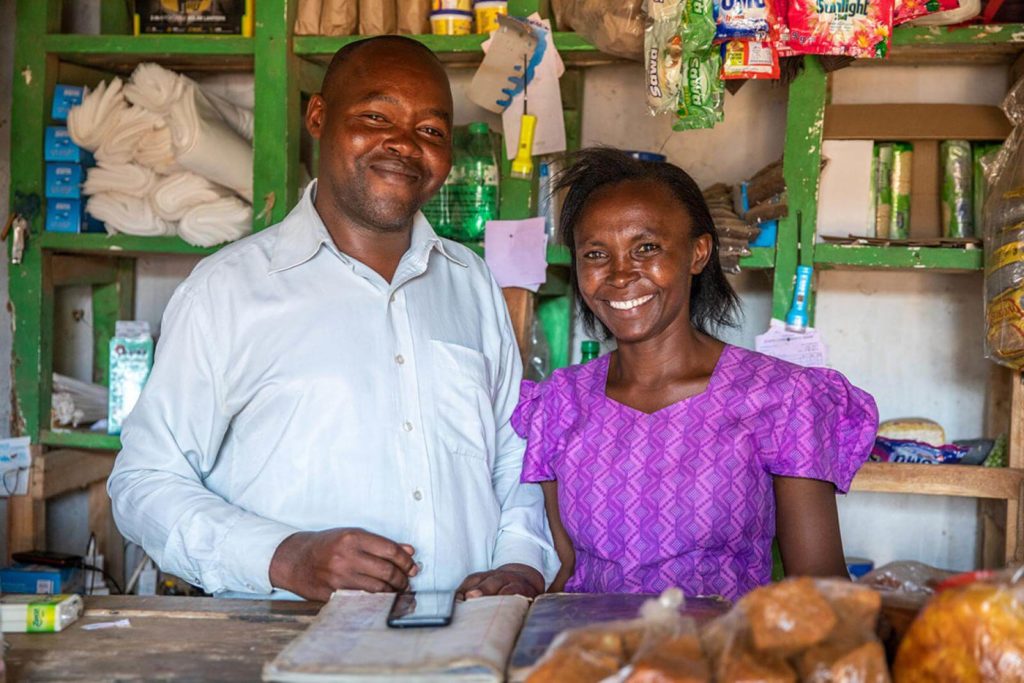
Man-Made Disasters
Man-made disasters are anything caused by humans, with a few common examples including oil spills and conflicts. Conflicts around the world drive 80% of all humanitarian needs and compound challenges in other cause areas. Unfortunately, there are many countries around the world where conflict undermines the daily lives of civilians but doesn’t receive media attention. You can learn more about the 10 most under-reported humanitarian crises of 2021.
Complex Crises
As pictured below, a complex crisis occurs when several kinds of emergencies coincide in one area.
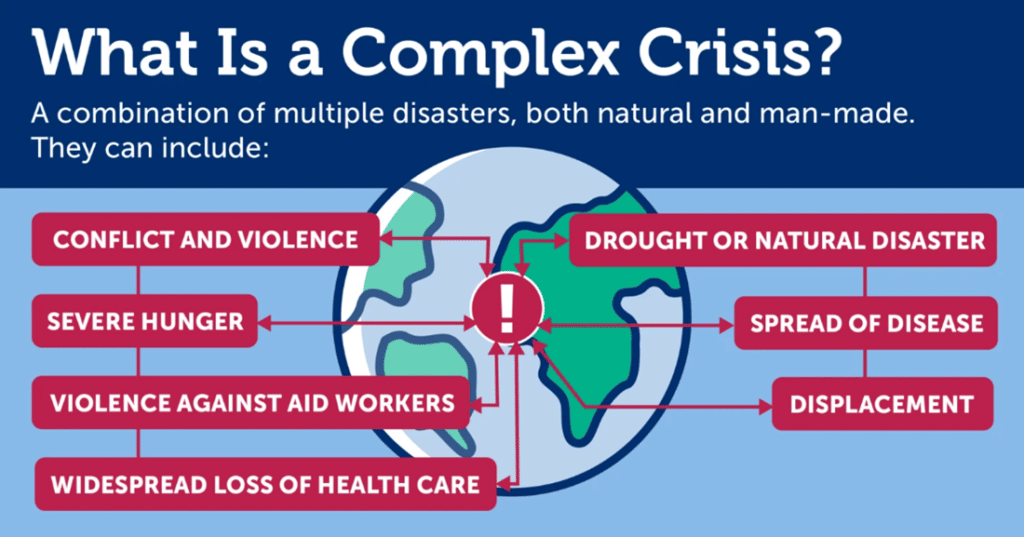
Russia’s invasion of Ukraine created a complex crisis as the violence on the ground displaces millions of residents from their homes in search for safety, disrupts regular access to health care, and impedes their large exports of grain to vulnerable countries in need like Yemen, Somalia, Ethiopia, Egypt and Nigeria. When the war began, our donors rose to the occasion with compassion, kindness and support. Their donations helped fund life-changing operations from our charity partners like Direct Relief and Project HOPE.
Direct Relief has deployed more than 900 tons of medical aid and $15 million in financial assistance to Ukraine since the war began. Their work still runs strong, and they’ve released a six-month report on their efforts.
Project HOPE’s Executive Vice President, Chris Skopec, highlighted a heartbreaking encounter with Ukrainian refugee in April 2022. So far, the organization has delivered 302 pallets of aid worth $6.5 million to 91 health facilities inside Ukraine, and supports refugees in need across Moldova, Poland and Romania. See the latest updates on Project HOPE’s response.
While Ukraine is the most publicized complex crisis in the news lately, many other countries face similar battles. In South Sudan, violence against women and girls is endemic, exacerbated by ongoing conflict and chronic displacement. This is why gender-based violence (GBV) prevention and response remain at the core of International Medical Corps’ assistance in the country.
In Aburoc, Global Impact charity partner International Medical Corps has Women- and Girl-Friendly Spaces (WGFS) where their GBV team organizes activities such as sewing and beading. The WGFS also host literacy and math classes where attendees can gain foundational skills. Community leader Charles Chol is helping their team challenge and prevent GBV by mobilizing men in his community to be part of the change. “Domestic violence is a big problem in our community,” he explains. “It is important to involve men in gender-based violence activities because men are the perpetrators and need to be part of the solution.” This project aims to empower communities and build resilience by promoting social and behavioral change to address the root causes of GBV.
In Malakal, a small business grant has helped Nyabach develop her food stall. “Before International Medical Corps came, I was cooking and selling mandazis [a type of fried bread]—but I wasn’t making any profits,” says Nyabach. “Now, thanks to the loan they provided, I was able to expand my business and add more to the menu, which allowed me to make a profit.”
With a little help, women like Nyabach can achieve great things, and men like Charles can use their standing to convey an essential message: there is no place for violence against women and girls in their communities.
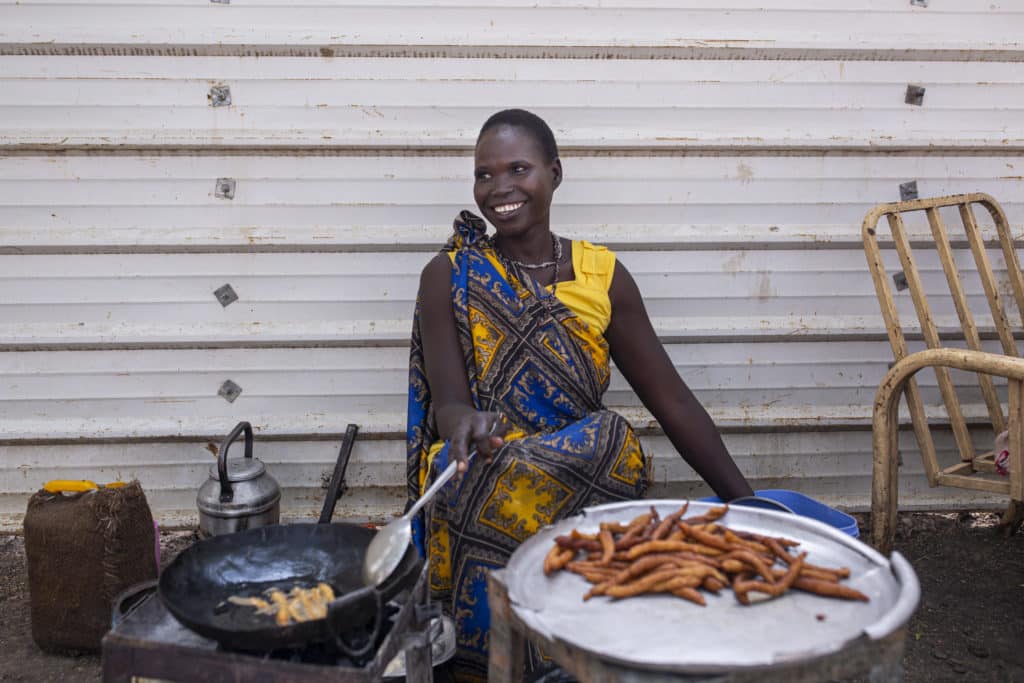
Another complex crisis that our charity partners are responding to is COVID-19. Not only is it an ongoing public health emergency, but it has also strained the worldwide economy, education systems, mental health and more. Charity Alliance member Americares continues to provide support for both physical and mental health needs in their partners’ clinics during COVID-19. In the spring of 2021, Keila and her family battled COVID-19. Keila’s physical symptoms weren’t bad, but the isolation during quarantine took a toll on her mental health. Things worsened when her daughter Camilla was born and rushed to a hospital an hour away; Keila’s husband watched over the infant, leaving Keila recovering by herself, unable to have visitors. “I felt alone and separated,” says Keila. She reached out for help from Gardner South Clinic, an Americares partner and safety-net clinic that serves low-income, uninsured patients in Keila’s hometown of Gilroy, California.
Americares provided Gardner and more than 50 other safety-net clinics in California with mental health and preparedness training for health workers on the front lines of the COVID-19 pandemic. The training is part of Americares efforts to build capacity for behavioral health services in safety-net clinics around the world. “We’ve been seeing more and more patients in the clinic showing some kind of depressive state,” says Guadalupe Perez, clinic manager at Gardner Health Center in nearby San Jose. “Pandemics don’t bring good things to anybody. Whether you’re in health care or education or anywhere, it just brings an additional stress.” Keila received behavioral health care on the phone, via telehealth. Having that access made a huge difference in her life. Americares supports over 4,000 health centers in the U.S. and around the world, including Gardner South Clinic.
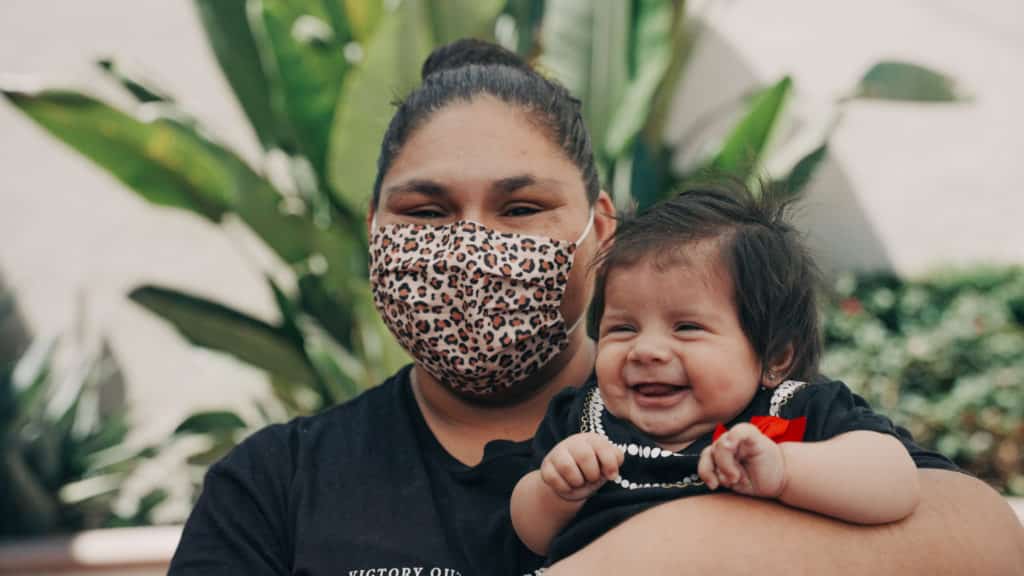
Be a global champion for disaster relief
No matter what type of disaster occurs next, a gift through your workplace giving campaign supports our charity partners as they aid communities in recovery and resilience. These donations come unrestricted, meaning the nonprofit of your choosing can use your dollars where it’s needed most. You can also make the most of your gift with these three steps:
- Check for a match
Many employers will match your donation when you contribute through your employee giving campaign. It’s an easy way to double the impact of your gift! - Help plan for unexpected needs with payroll deductions
If you’re passionate about disaster relief efforts, a payroll deduction donation is a great option. This way you can set aside a small amount per paycheck before it hits your bank account. These deductions are also tax-deductible, so you will reap tax benefits for your charitable giving. - Inspire your colleagues
Workplace giving campaigns are a great way to collaborate with coworkers outside of your routine tasks. You can build better relationships through volunteer opportunities, serving as a campaign worker, or simply sharing more about the causes close to your heart with others.
Another way you can support these charities is pledging to Global Impact’s Disaster Relief Fund. One donation through this fund supports multiple charities working on disaster relief.

